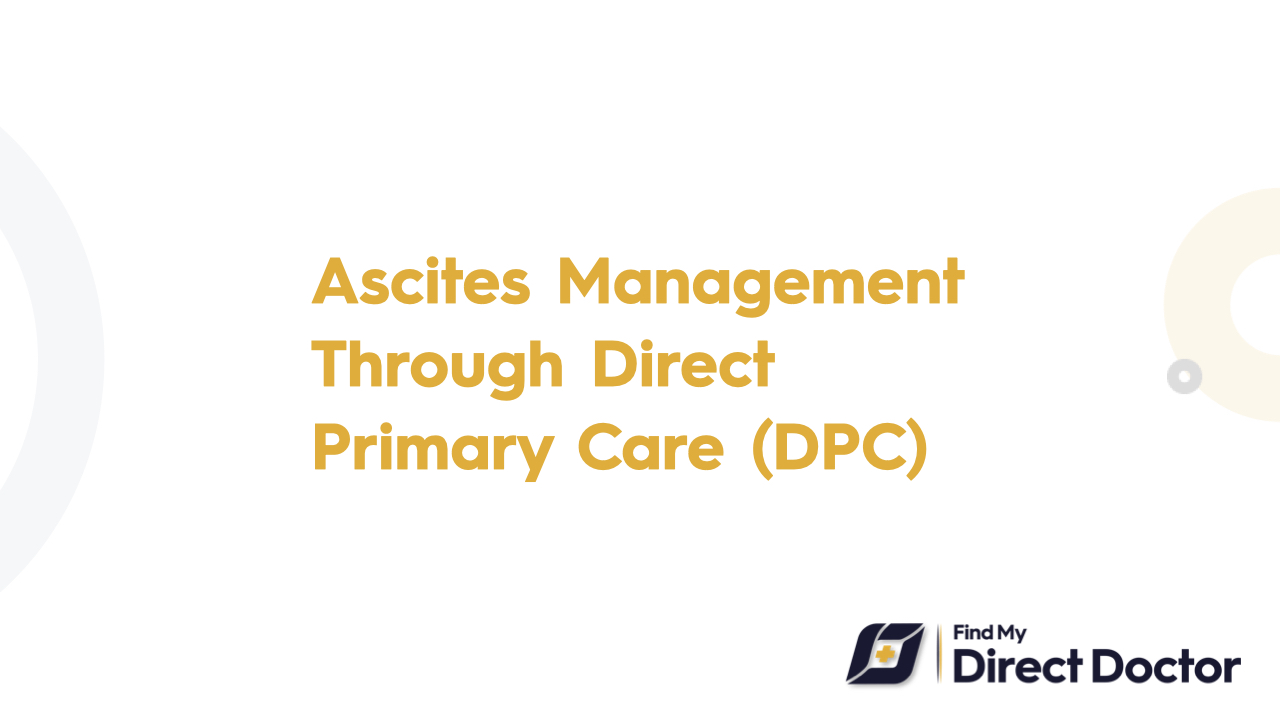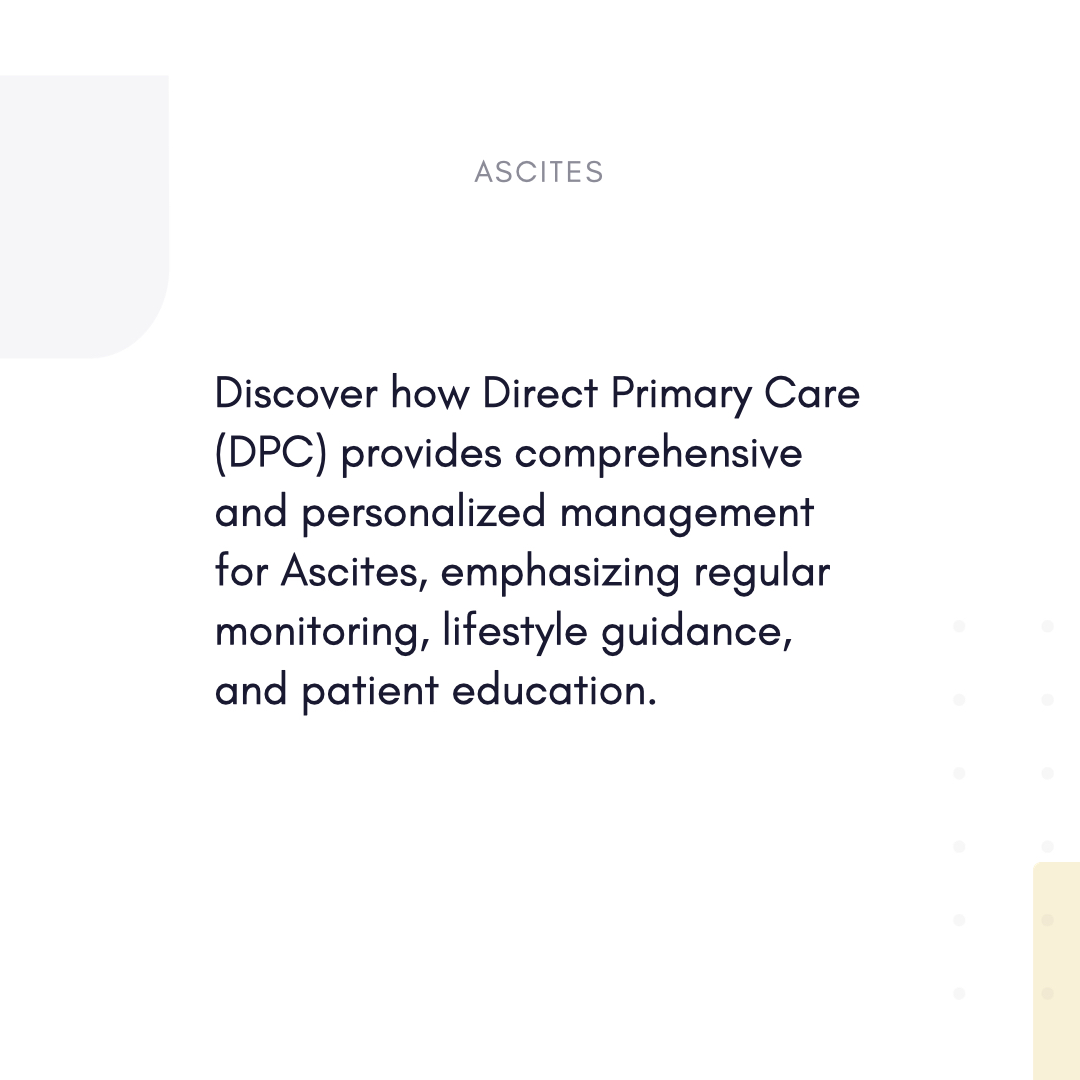Ascites and Direct Primary Care (DPC): Comprehensive, Patient-Centered Fluid Management
Often a sign of underlying diseases including liver cirrhosis, heart failure, or cancer, ascites—the aberrant accumulation of fluid in the abdominal cavity—may also indicate good management calls for preventing complications, symptom relief, and root cause identification. Combining timely diagnostics, individualized treatment, and continuous monitoring to increase quality of life and lower hospitalizations, Direct Primary Care (DPC) presents a patient-centered approach to ascites care.

Appreciating Ascites: Important Difficulties
Causes:
- Most often occurring liver cirrhosis
- Heart failure
- Cancer
- Infections
- Kidney disease
Symptoms:
- Abdominal swelling
- Fast weight increase
- Bloating
- Dyspnea
- Nausea
Complications:
- Hepatorenal syndrome
- Malnutrition
- SBP—spontaneous bacterial peritonitis
Diagnosis:
- Physical exams
- Ultrasounds
- Paracentesis—fluid analysis
- Labs—e.g., serum-ascites albumin gradient
How DPC Improves Ascendites Management?
A membership model (USD 50–200/month), Direct Primary Care (DPC) grants unrestricted access to a primary care physician. For patients in ascites, this entails:
- Not waiting for urgent evaluations of worsening symptoms
- Clear pricing—discounted labs, imaging, and expert referrals
- Holistic treatment covering nutrition, underlying conditions, and fluid management
Quick Diagnosis and Tracking
- Coordination of ultrasonic waves: At cash-pay rates (USD 100–300), note fluid volume and liver abnormalities
- Coordinating paracentesis: For safe fluid removal, team with radiologists or hepatologists
- Lab work includes reasonably priced albumin, creatinine, and infection tests to direct treatment
Individualized Treatment Plans
DPC combines according American Association for the Study of Liver Diseases (AASLD) recommendations:
- Diuretic therapy: Based on weight and lab trends, change spironolactone or furosemide dosages
- Meal plans low in sodium (<2,000 mg/day) will help lower fluid retention
- Prescribe prophylactic antibiotics—such as norfloxacin—for SBP patients with high risk
Prevention and Specialist Coordination
- Referrals to hepatologists or cardiologists: For control of advanced liver or heart diseases
- Collaboration between nutritionists: Talk about muscle wasting and protein shortage
- Assistance for mental health: Counseling for anxiety connected to a chronic condition
DPC's Advantage for Patients with Ascites
Access to Care Timely:
- Same-day visits for unexpected weight loss or stomach pain
- 24/7 telehealth to treat signs of SBP including fever or confusion
Affordably Priced Remedies:
- Drugs: USD 5–15/month diuretics instead of USD 50+ retail
- Cash-pay rates (USD 300–500) compare to USD 1,500+ in hospitals
- Individualized treatments for cancer-related ascites, heart failure, or cirrhosis
Tracking:
- Weight and abdominal girth regularly helps one modify treatments
DPC's Customized Ascites Management
Individualized care is stressed by the AASLD. DPC presents this through:
For Ascites Associated with Cirrhosis:
- Restriction of sodium: Coaching to create low-salt recipes and shopping lists
- Coordinate outpatient treatment to enhance diuretic response by albumin infusions
For Malignant Ascites:
- Palliative care: For shunt placements or therapeutic paracentesis, team with oncologists
- Opioids or nerve blocks help control pain
For Every Patient:
- Early complication detection: Frequent labs to identify kidney or SBP abnormalities
- Teach emergency response and symptom recognition—fever, stomach pain
Personal Success Stories from Real Life
Case 1: Through DPC's weekly weight checks and diuretic changes, Linda, 55 with cirrhosis avoided hospitalization and stabilised her fluid retention.
Case 2: Using DPC's negotiated rates, 68-year-old James saved USD 1,200 on paracentesis, controlling his cancer-related ascites reasonably.
Typical Questions: DPC and Ascites
Q: Is DPC able to do paracentesis?
A: DPC doctors coordinate with specialists for reasonably priced, timely treatments while they do not perform it.
Q: Exclusively low-sodium diet guides available?
A: Indeed! DPC offers tailored meal plans and nutritionist referrals.
Q: How does DPC respond to SBP-related crises?
A: Post-discharge follow-up and immediate ER coordination help control antibiotics and recovery.
Why DPC Is Essential for Ascites Management?
- Helps prevent hospitalizations: Early intervention lowers complications like kidney failure or SBP
- Streamlines coordination: One provider controls labs, diuretics, and specialist referrals
- Educates patients on diet, symptom tracking, and when to visit urgent care
Control Your Health Using DPC
Although ascites management is complicated, DPC provides a partner committed to individualized, easily available, reasonably priced treatment that helps you avoid crises, lower fluid buildup, and treat underlying conditions.






